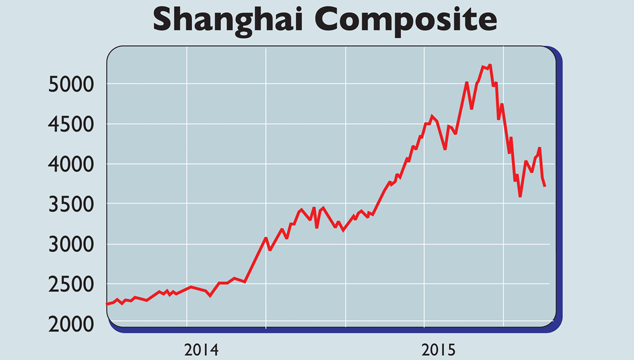China: gravity takes over in the stockmarket
Last Monday, the stockmarket in China fell by 8.5%, its worst day since early 2007, and second-worst percentage drop ever.

Get the latest financial news, insights and expert analysis from our award-winning MoneyWeek team, to help you understand what really matters when it comes to your finances.
You are now subscribed
Your newsletter sign-up was successful
Want to add more newsletters?

Twice daily
MoneyWeek
Get the latest financial news, insights and expert analysis from our award-winning MoneyWeek team, to help you understand what really matters when it comes to your finances.

Four times a week
Look After My Bills
Sign up to our free money-saving newsletter, filled with the latest news and expert advice to help you find the best tips and deals for managing your bills. Start saving today!

Until this week, the Shanghai Composite index had rallied for three weeks in a row. Investors were starting to think that the government had managed to stabilise the market after doing practically everything to prop stocks up. It loosened monetary policy, stopped flotations and share sales by major stockholders, banned short selling, and bought stocks.
But last Monday the market fell by 8.5%, its worst day since early 2007, and second-worst percentage drop ever. The next day it fell marginally, as state-directed investors piled in again.
It looks as though the government took its foot off the accelerator on Monday, reducing capital inflows after its recent "frenzied" efforts, says Nigel Green of deVere Group and gravity promptly took over. The government's arsenal isn't exhausted yet, says John Foley on breakingviews.com.
MoneyWeek
Subscribe to MoneyWeek today and get your first six magazine issues absolutely FREE

Sign up to Money Morning
Don't miss the latest investment and personal finances news, market analysis, plus money-saving tips with our free twice-daily newsletter
Don't miss the latest investment and personal finances news, market analysis, plus money-saving tips with our free twice-daily newsletter
It could cut interest rates again, or insist that state-owned companies buy back their shares, for instance. "But short of announcing an open-ended direct purchase of shares in the market, all options are likely to have diminishing returns."
Beijing now faces "an unenviable choice", as the Financial Times points out: sink even more into its campaign to stop allowing stocks to settle at their natural level, "or let slip its mask of invulnerability". The market could be in for a rocky ride either way.
Bullishness will dwindle if the government keeps acting but seems unable to bolster stocks, but if it now steps away there will be further falls as people fear there is no safety net at all. The state has forfeited credibility and could dent confidence by having to "concede a clear limit to its powers", says the FT.
Along with the commodities slump and the junk bond jitters, China's slump is a worry for investors. However, it looks far more containable than the other two. As Roger Bootle of Capital Economics notes, China's stockmarket is worth just 30% of GDP, compared to over 100% in most countries. One in 30 Chinese owns shares, compared to one in seven Americans.
Also, the market is still up by 66% on a year ago, so a downward wealth effect is unlikely. "Nor is the equity market important as a channel for companies to raise finance." Some brokerages may go bust, given the margin debt in the market, but overall the potential impact on China's economy, and global growth, looks limited.
Get the latest financial news, insights and expert analysis from our award-winning MoneyWeek team, to help you understand what really matters when it comes to your finances.

-
 Should you buy an active ETF?
Should you buy an active ETF?ETFs are often mischaracterised as passive products, but they can be a convenient way to add active management to your portfolio
-
 Power up your pension before 5 April – easy ways to save before the tax year end
Power up your pension before 5 April – easy ways to save before the tax year endWith the end of the tax year looming, pension savers currently have a window to review and maximise what’s going into their retirement funds – we look at how